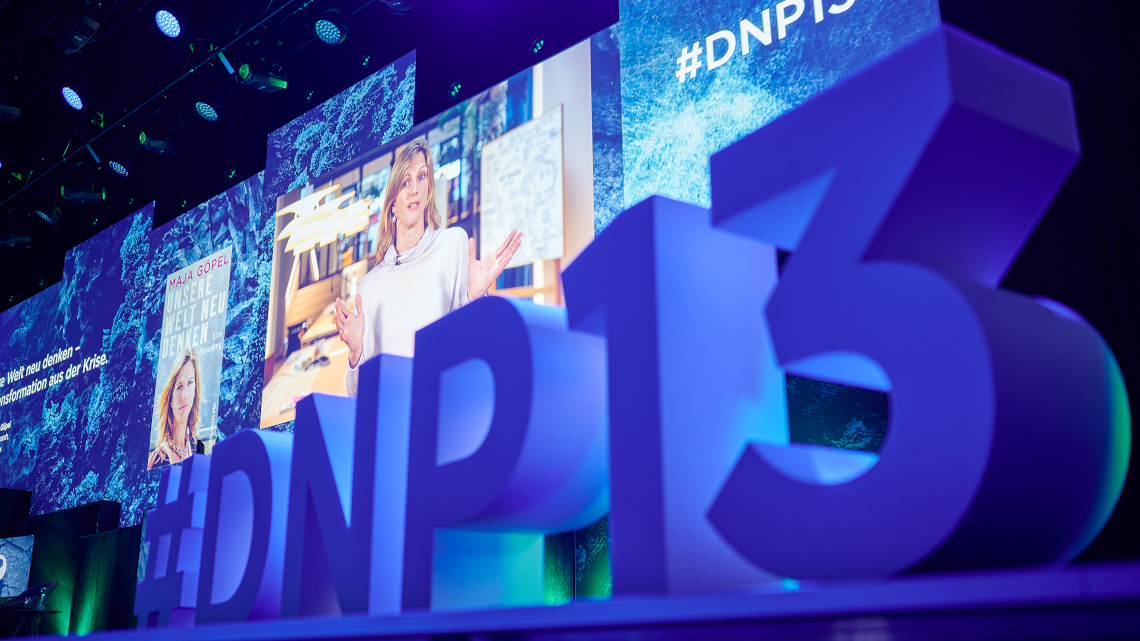The pandemic as an opportunity for sustainability
The 13th German Sustainability Day was dominated by the corona crisis. In virtual forums, around 100 experts discussed the opportunities of the pandemic for a sustainable future.

For the past nine months, the coronavirus has determined the lives of people worldwide. From hygiene rules to contact and travel restrictions: the consequences of the pandemic are felt in all areas of social life. But the fight for survival has also shown new ways and made people more aware of issues such as sustainability and environmental protection. Can the crisis be seen as an opportunity for a transformation of society towards more sustainability? This question was the focus of the now 13th German Sustainability Day in Düsseldorf. Unlike usual, this year the congress took place online.
On 3 and 4 December 2020, around 100 experts from politics, business and research discussed the opportunities of the corona crisis for a more sustainable society. In the various sessions, which were each broadcasted live on the internet, dealt with exciting topics such as crisis-proof business models, the role of companies and start-ups and changing consumer behavior. Concepts for sustainable urban development, circular economy, ecological packaging solutions as well as climate protection and biodiversity were debated.
The crisis as an opportunity for sustainable management
In her presentation, Maja Göpel from "The New Institute" inspired to "rethink the world". The scientist and author of the book of the same name sees the Corona crisis as a historic opportunity to refocus on the common good and build a sustainable economy. She is convinced that "transformation means the gradual shift of worn-out models." Furthermore, "the crisis has shown that society is capable of finding new solutions when limits are pointed out," Göpel said. The scientist is a member of the newly elected Bioeconomy Council, which advises the German government on the implementation of the National Bioeconomy Strategy.
Customers honor sustainability
The lockdown in spring disrupted many supply chains and showed the German economy its dependencies. As a matter of fact, the economy is suffering from the crisis. According to the Chamber of Industry and Commerce, two-thirds of small and medium-sized businesses suffered severe losses. How such crises can be used economically and whether sustainable companies are better able to cope with these phases was discussed in the session "Crisis business models". The session confirmed that sustainable business is worthwhile. Hinnerk Ehlers from Frosta, a frozen food producer, reported that tight and long-term supply chains prevented production from coming to a standstill. The company has long been a pioneer in the field of sustainability. "The trend toward sustainability has continued during the crisis. More and more customers have honored that," Ehlers said.
Founding start-ups during the crisis
Start-ups in particular have recognized the opportunities presented by the pandemic. "The crisis is a start-up time," summed up Lina Behrends, President at the Federal Association of German Start-ups. In the first half of this year alone, there were more than 11 percent more start-ups compared to last year - including sustainable business models. "Innovations are an important aspect of a company's resilience," Behrends said. However, such innovations must always be brought together with sustainability. According to Behrends, collaborations with startups could help bring sustainable ideas into large companies.
Advancing recycling
The protection of biodiversity and the sustainable use of resources are the driving forces behind many innovations - and not just among start-ups. Even large companies like BASF are focusing on new processes to conserve resources, such as chemical recycling. In a debate about the new technology, one thing became clear: Many raw materials are still lost due to inadequate raw material recycling. "Too many plastics are not yet recycled, even though the Green Dot has been around for 30 years," said Viola Wohlgemuth of Greenpeace. Volker Rehrmann of TOMRA Recycling also emphasized that PET bottles are the only case in which the principle of the circular economy has worked so far. An alternative could be chemical recycling - a process that splits polymer chains again and thus recovers oils that can be reused for plastic production.
Better plastic recycling using watermark
The question is whether chemical recycling is really a milestone of a true circular economy."It's not the sole solution," admitted Saori Dubourg, board member at BASF, during the panel discussion, "but it is a good alternative to recycle contaminated packaging materials." BASF has already been able to produce some new products from the recovered pyrolysis oil. Another option to improve plastic recycling would be to mark plastic bottles with a watermark that is recognized by sorting machines.
Bio-based binders and sustainable agriculture
Biodiversity was a further topic at the event. The focus was on the question of how players from the food industry and trade can avoid destroying biodiversity and thus our basis of life. DAW SE is taking an unusual approach here: The manufacturer of paints and coatings specifically cultivates gold of pleasure and peas in fields in order to produce bio-based binders for wood preservatives. This not only promotes the company's sustainability, but also biodiversity. According to Christian Walter, the biodiversity of pollinators in these fields increased significantly.
Maintainging positive effects of the pandemic
At times, social life was massively restricted by the corona crisis. However, abstaining from consumption during the lockdown has also shown positive effects, as Stephan Grünwald from the Rheingold Institute in Cologne described. He has researched consumption behavior during the corona crisis. "Not everyone felt this restriction as a loss. There were moments of grief, but also the realization that 'less can also be more,'" Grünwald said. According to the researcher, abstinence has led to a confidence to change and has pronounced sustainability issues. But how can the positive effects of the pandemic be carried over into the post-Corona era? "People need to feel they can master change with little effort," they said. In addition, innovations must deliver added value.
Organic products are booming
The food industry in particular seems to be a winner of the crisis. "Organic foods in particular have experienced a boom," said Kerstin Erbe, managing director of the drugstore chain dm. "This trend toward sustainable products has been reinforced during the crisis." Organic food suppliers such as followfood registered that "people are willing to spend more on products that meet social-ecological standards."
With the German Sustainability Strategy, the German government has created a guideline for implementing the 17 Sustainable Development Goals (SDGs) set by the United Nations in Agenda 2030. The German Sustainability Day showed: Many large companies, but especially start-ups, have already put the topic of sustainability on their agenda and are leading the way with innovations.
Podium for sustainable companies and start-ups
As part of the German Sustainability Day, the most sustainable companies in Germany were traditionally awarded the German Sustainability Award on the evening of the second day of the congress, and start-ups were honored for their green ideas with the "Next Economy Award". At the same time, the German Sustainability Award for Research was presented, which this year focused on the urban bioeconomy.
bb


